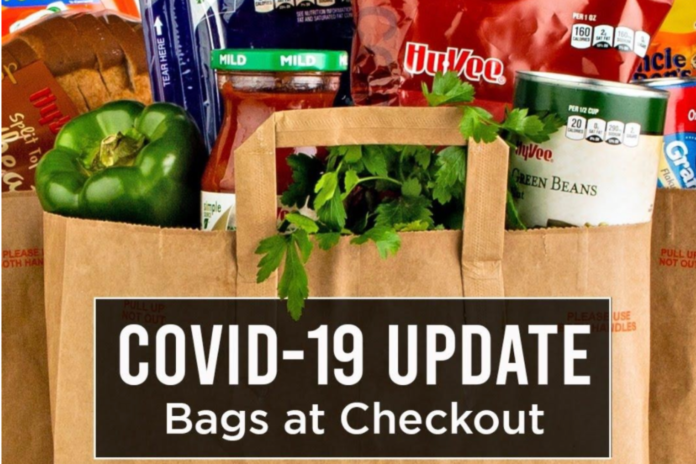Grocery chain Hy-Vee announced on Thursday that they’re banning reusable bags in all their stores across the region until further notice, beginning Friday.
The Midwest grocery store chain that comprises 246 stores in eight states, and which recently opened several stores in the Twin Cites suburban metro, announced the new policy in Facebook posts on all of their pages on Thursday, including their Twin Cities stores. The policy went into effect on Friday.
The company cited concerns over people not sanitizing reusable bags properly and wanting to take precautions to prevent the spread of the coronavirus strain COVID-19.
Earlier this week, a column in Forbes stated that the pandemic was prompting calls to suspend or repeal bag bans and fees claiming that there is mounting evidence that reusable bags are “dangerously effective when it comes to spreading bacteria and disease.”
The column linked to a University of Arizona study found that reusable shopping bags are often used for multiple purposes, transported and set down in many difference places, and “seldom if ever washed.”
The Wall Street Journal Editorial Board also published an opinion piece this week noting that reusable bags are “notoriously dirty and may spread the [cornona] virus.”
The piece referenced the 2013 outbreak of novel swine enteric coronavirus disease that killed millions of pigs in the United States. A US Dept. of Agriculture investigation following the outbreak concluded that reusable feed totes were the most likely root cause of the spread of the virus. The feed bags are often made of the same kind of material as reusable shopping bags, the WSJ piece noted.
Several states and hundreds of cities across the US have implemented plastic bag bans or regulations in recent years.
In 2017 the Minnesota state legislature enacted a provision that stopped cities within the state from banning plastic bags. However, cities like Minneapolis and Duluth have since enacted bag fees to get around the state preemption, effectively implementing de facto plastic bag bans within their cities.
In Minneapolis, City Council member Cam Gordon introduced the five-cent bag fee ordinance that went into effect earlier this year requiring retailers to charge a nickel fee per bag to customers who choose to use store-provided plastic bags. The city of Duluth passed a similar ordinance that is slated to take effect on April 1.
Although Hy-Vee has no stores within the cities of Minneapolis or Duluth, Hy-Vee’s decision could prompt other grocery and retail stores throughout the state and nation to enact similar policies in the wake of COVID-19 fears.
Council member Gordon said he appreciates that Hy-Vee is trying to do everything they can to prevent infection, but he said he has no plans to change or suspend the bag fee ordinance in Minneapolis in the wake of COVID-19 concerns.
Gordon referenced information he received from a health department official that said, “reusable bags have a very low risk of transmission.” Gordon said he’s encouraging everyone to “wash everything regularly and often,” including reusable bags, backpacks and purses that may be taken out in public and set down on surfaces.
###















